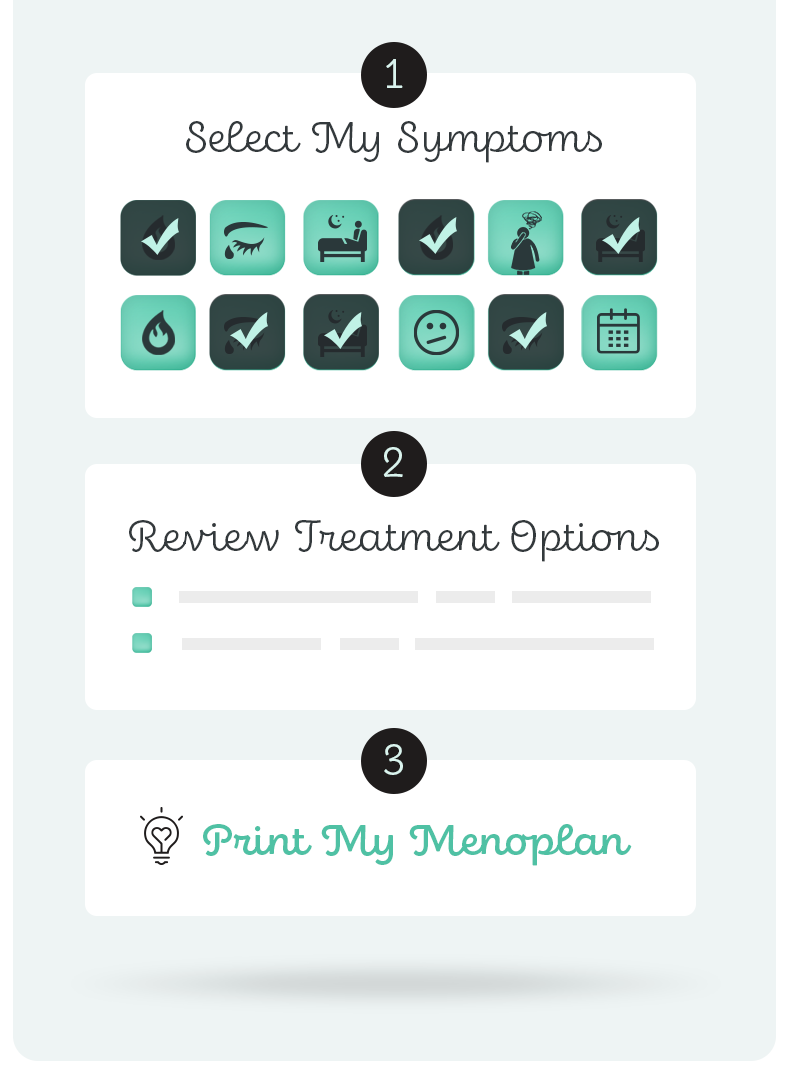Treatments
WHAT IS IT?
Selective Serotonin Reuptake Inhibitors (SSRIs) and Selective Norepinephrine Reuptake Inhibitors (SNRIs) are drugs for depression and anxiety. But they can also help with menopause symptoms. They can affect how the body controls core temperature.
Some of the brand names of the drugs are: paroxitine (Paxil, Brisdelle), citalopran (Celexa), escitalopram (Lexapro), venlafaxine (Effexor), and desvenlafaxine (Pristiq). You need a prescription to get these pills.
OUR BOTTOM LINE: DOES IT HELP?
YES. SSRIs and SNRIs can help with hot flashes, sleep problems, anxiety, and depression. At low doses, they tend to have few side effects. Your health care provider will consider your health and other drugs you take to help you decide if an SSRI or SNRI would be safe for you. They tend to work as well as low-dose hormone replacement therapy in reducing hot flashes.

HOT FLASHES AND NIGHT SWEATS
SSRIs and SNRIs reduce total hot flashes and night sweats by about 1-2 per day and decrease their severity. Venlafaxine decreases how much hot flashes/night sweats interfere in daily life. These drugs may take up to 4 weeks to start working. The brands listed above work better than Prozac and Zoloft for hot flashes and night sweats.

SLEEP PROBLEMS & INSOMNIA
Research on women with hot flashes shows that SSRIs or SNRIs help with sleep problems. They can reduce insomnia and improve sleep quality and duration.

MOOD, ANXIETY & DEPRESSION
SSRIs and SNRIs can decrease anxiety and depression in women with menopause symptoms.

ACHES AND PAINS
In a study of perimenopausal women with hot flashes escitalopram improved generalized pain.

LOW SEX DRIVE
In doses used to treat depression, SSRIs and SNRIs may decrease sexual desire. But, in studies of low dose venlafaxine and escitalopram for menopause symptoms, sexual function in nondepressed midlife women with hot flashes did not change. A subtle decrease in orgasm and pain was found.

VAGINAL PAIN, NOT DURING SEX
SSRIs and SNRIs have no effect on vaginal pain.
POTENTIAL RISKS & SIDE EFFECTS
Pills come in different doses, or strengths. Low-dose pills are used to manage hot flashes and nights sweats. Depression is often treated with higher doses. At low doses, most women do not have side effects. Your health care provider can tell you what is a low dose.
Some women taking SSRIs or SNRIs have nausea, dizziness, dry mouth, nervousness, diarrhea, constipation, headache, blurred vision, or insomnia.
Some women taking SSRIs or SNRIs become less interested in having sex (low libido). Studies show low-dose Effexor and Lexipro did not affect the sex drive of women who were not depressed.
Effexor may increase your blood pressure. It is important to talk with your health care provider about whether you should monitor your blood pressure if you take it.
Your body can become dependent on SSRIs and SNRIs. If you miss several doses or stop taking the drug abruptly, you may have symptoms such as nausea, dizziness, tiredness, flu-like symptoms, or feeling uneasy. When you are ready to stop the drug, work with your doctor to gradually decrease the dose. SSRIs and SNRIs are NOT considered addictive.
If you are taking tamoxifen for breast cancer, talk with your oncologist before taking an SSRI or SNRI.
Potential side effects of treatment with SSRIs and SNRIs include nausea, dizziness, dry mouth, nervousness, constipation and problems with sexual function such as low libido. However, tolerability of these medications at lower doses used to treat menopausal symptoms is high. For example, treatment of midlife non-depressed women with hot flashes with escitalopram or low dose venlafaxine for 8 weeks does not reduce overall sexual function. Use of venlafaxine may increase blood pressure and monitoring is recommended, especially for women at higher risk for hypertension. If a woman has breast cancer and is taking tamoxifen, earlier research suggested that she should not take certain SSRIs (e.g. paroxetine or fluoxetine) because these medications might interfere with the body’s metabolism of tamoxifen, possibly reducing the benefit of tamoxifen. However, more recent studies suggest that the effects of these SSRIs on tamoxifen metabolism should not reduce the benefit of tamoxifen in the treatment of breast cancer.
In a study of the SSRI escitalopram about one third of women found that their symptoms returned after it was discontinued.
QUALITY OF LIFE EXPECTATIONS
In a study of menopausal women with hot flashes escitalopram improved menopause related quality of life.
IF I WANT TO TRY THIS TREATMENT WHAT ARE MY NEXT STEPS?
If you want to consider using SSRIs or SNRIs for your symptoms, you should discuss this with your health care provider.
SSRI and SNRI medications are recommended as one of the first-line medication treatments for hot flashes, especially in women unable or unwilling to take estrogen. SSRIs and SNRIs are typically used to treat depression or anxiety, but they can also have effects on other bodily functions including body core temperature control.
Which work best for menopause symptoms? Treatment with selected SSRIs (paroxetine [Paxil, Brisdelle], citalopram [Celexa], escitalopram [Lexapro]) and SNRIs (Venlafaxine [Effexor], Desvenlafaxine [Pristiq]) in midlife women has been shown to relieve hot flashes. In addition, use of these medications among midlife women with hot flashes reduces sleeping difficulties such as insomnia symptoms and improves mood and overall quality of life. Evidence suggests that other drugs in the SSRI class including fluoxetine (Prozac) and sertraline (Zoloft) do not work as well as the SSRI and SNRI medications listed above for relief of hot flashes.
Arch Gynecol Obstet. 2016 May;293(5):1007-13. doi: 10.1007/s00404-015-3900-1. Epub 2015 Oct 5. PMID: 26437957
Caan B, LaCroix AZ, Joffe H, Guthrie KA, Larson JC, Carpenter JS, Cohen LS, Freeman EW, Manson JE, Newton K, Reed S, Rexrode K, Shifren J, Sternfeld B, Ensrud K. Effects of estrogen and venlafaxine on menopause-related quality of life in healthy postmenopausal women with hot flashes: a placebo-controlled randomized trial. Menopause. 2015 Jun;22(6):607-15. doi: 10.1097/GME.0000000000000364. PMID: 25405571 Free PMC Article
Capriglione S, Plotti F, Montera R, Luvero D, Lopez S, Scaletta G, Aloisi A, Serra GB, Angioli R. Role of paroxetine in the management of hot flashes in gynecological cancer survivors: Results of the first randomized single-center controlled trial. Gynecol Oncol. 2016 Dec;143(3):584-588. doi: 10.1016/j.ygyno.2016.10.006. Epub 2016 Oct 15.
Carpenter JS, Guthrie KA, Larson JC, Freeman EW, Joffe H, Reed SD, Ensrud KE, LaCroix AZ.Effect of escitalopram on hot flash interference: a randomized, controlled trial. Fertil Steril. 2012 Jun;97(6):1399-404.e1. doi: 10.1016/j.fertnstert.2012.03.001. Epub 2012 Apr 3.PMID:22480818 Free PMC Article
Davari-Tanha F, Soleymani-Farsani M, Asadi M, Shariat M, Shirazi M, Hadizadeh H. Comparison of citalopram and venlafaxine’s role in treating sleep disturbances in menopausal women, a randomized, double-blind, placebo-controlled trial.
Effects of Pharmacologic and Nonpharmacologic Interventions on Insomnia Symptoms and Self-reported Sleep Quality in Women With Hot Flashes: A Pooled Analysis of Individual Participant Data From Four MsFLASH Trials. Sleep. 2018 Jan 1;41(1). doi: 10.1093/sleep/zsx190. PMID: 29165623 Free PMC Article
Guthrie KA, LaCroix AZ, Ensrud KE, Joffe H, Newton KM, Reed SD, Caan B, Carpenter JS, Cohen LS, Freeman EW, Larson JC, Manson JE, Rexrode K, Skaar TC, Sternfeld B, Anderson GL.Pooled Analysis of Six Pharmacologic and Nonpharmacologic Interventions for Vasomotor Symptoms.Obstet Gynecol. 2015 Aug;126(2):413-22. doi: 0.1097/AOG.0000000000000927.PMID: Free PMC Article
Joffe H, Guthrie KA, Larson J, Cohen LS, Carpenter JS, Lacroix AZ, Freeman EW. Relapse of vasomotor symptoms after discontinuation of the selective serotonin reuptake inhibitor escitalopram: results from the menopause strategies: finding lasting answers for symptoms and health research network. Menopause. 2013 Mar;20(3):261-8. doi: 10.1097/GME.0b013e31826d3108. PMID:23435022 Free PMC Article
Joffe H, Guthrie KA, LaCroix AZ, Reed SD, Ensrud KE, Manson JE, Newton KM, Freeman EW, Anderson GL, Larson JC, Hunt J, Shifren J, Rexrode KM, Caan B, Sternfeld B, Carpenter JS, Cohen L. Low-dose estradiol and the serotonin-norepinephrine reuptake inhibitor venlafaxine for vasomotor symptoms: a randomized clinical trial. JAMA Intern Med. 2014 Jul;174(7):1058-66. doi: 10.1001/jamainternmed.2014.1891. PMID: 24861828 Free PMC Article
LaCroix AZ, Freeman EW, Larson J, Carpenter JS, Joffe H, Reed SD, Newton KM, Seguin RA, Sternfeld B, Cohen L, Ensrud KE. Effects of escitalopram on menopause-specific quality of life and pain in healthy menopausal women with hot flashes: a randomized controlled trial. Maturitas. 2012 Dec;73(4):361-8. doi: 10.1016/j.maturitas.2012.09.006. Epub 2012 Sep 30. PMID: 23031421 Free PMC Article
North American Menopause Society. Nonhormonal management of menopause-associated vasomotor symptoms: 2015 position statement of The North American Menopause Society.Menopause. 2015 Nov;22(11):1155-72; quiz 1173-4. doi: 10.1097/GME.0000000000000546.
Reed SD, Mitchell CM, Joffe H, Cohen L, Shifren JL, Newton KM, Freeman EW, Larson JC, Manson JE, LaCroix AZ, Guthrie KA. Sexual function in women on estradiol or venlafaxine for hot flushes: a randomized controlled trial. Obstet Gynecol. 2014 Aug;124(2 Pt 1):233-41. doi: 10.1097/AOG.0000000000000386. PMID:25004335 Free PMC Article
Reed SD1, Mitchell CM, Joffe H, Cohen L, Shifren JL, Newton KM, Freeman EW, Larson JC, Manson JE, LaCroix AZ, Guthrie KA. Sexual function in women on estradiol or venlafaxine for hot flushes: a randomized controlled trial. Obstet Gynecol. 2014 Aug;124(2 Pt 1):233-41. PMID: 25004335 Free PMC Article
Shea AK, Meschino D, Wolfman W. The effect of serotonin reuptake inhibitors on the vaginal epithelium in postmenopausal women. Climacteric. 2019 Oct;22(5):507-510. doi: 10.1080/13697137.2019.1604655. Epub 2019 May 7. PMID: 1060386
Stubbs C, Mattingly L, Crawford SA, Wickersham EA, Brockhaus JL, McCarthy LH. Do SSRIs and SNRIs reduce the frequency and/or severity of hot flashes in menopausal women. J Okla State Med Assoc. 2017 May;110(5):272-274. Review. PMID: 28649145
Wei D, Chen Y, Wu C, Wu Q, Yao L, Wang Q, Wang XQ, Yang KH. Effect and safety of paroxetine for vasomotor symptoms: systematic review and meta-analysis. BJOG. 2016 Oct;123(11):1735-43. doi: 10.1111/1471-0528.13951. Epub 2016 Apr 7. Review. PMID: 27062457 Free Article
Authors: Dr. Hadine Joffe, Dr. Katherine Newton, & Dr. Leslie Snyder. Last reviewed February 15, 2021



